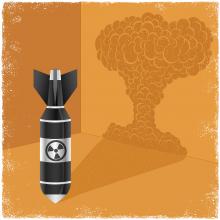determination

TO ENTER la fortaleza where Jhonny Rivas was being held prisoner, I had to hand over my passport and undergo a thorough search, which included squatting naked on top of a mirror laid on the floor. I wanted to turn around indignantly and go home. Instead I faced the two female guards, girls really, one with braces, the other with the acne of a teenager. Por favor, I appealed. They exchanged an unsure glance, no doubt worried about el capitán strutting outside, then gestured for me to put my clothes back on. At the door, I embraced them.
Blessed are those who don’t follow unrighteous rules, for they shall be hugged.
I confess that I often practice my own beatitudes lite. It’s where I often want to stop, at the easier, feel-good variety of activism. But the beatitudes are as morally rigorous as those daunting Ten Commandments, albeit working through positive reinforcement—blessings rather than “thou shalt nots.” If you truly embrace them, they keep pulling you further and further out of the comfort zone of the self that always wants to stop at having done its part.

MY GREAT-GRANDMOTHER, Elizabeth “Lizzie” Johnson, was born in 1890 in Camden, S.C., with a different last name from all the other people in her household. Three generations later, we have no idea where the name Johnson came from.
Lizzie grew up working plantation land owned by her grandmother, Lea Ballard. Lea received the land in the wake of the Civil War: We don’t know how or why, though one theory speculates that Lea, who was listed as a 42-year-old mulatto widow on the 1880 U.S. Census, may have been the daughter of her slave owner. He may have given the land to her after the Civil War. We don’t know. We only know that Lea owned it, that she had 17 children who worked that land, according to family lore, and that the city of Camden eventually stole the land from her by the power of eminent domain. This we know from records I hold in my possession.
Lizzie married a railroad man named Charles Jenkins. Lizzie and Charles had three children; Charles later died in a railroad accident. Lizzie had a choice: endure the brutality of the Jim Crow South alone with three kids, or move with the stream of black bodies migrating north. Lizzie migrated to Washington, D.C., and, eventually, to Philadelphia and took her lightest-skinned child with her.

THE NATIONAL LATINO Evangelical Coalition announced in March that it would no longer support the death penalty, making it the first U.S. evangelical association to take this stand. Coalition president Gabriel Salguero announced the change at a press conference in Orlando, Fla., and urged NaLEC’s 3,000 member congregations to work toward ending capital punishment nationwide.
“As Christ-followers, we are called to work toward justice for all. And as Latinos, we know too well that justice is not always even-handed,” said Salguero.

AS YOU READ this column, diplomats from the United States, the United Kingdom, France, Russia, China, Germany, and the European Union are working with their Iranian counterparts to finalize a deal concerning Iran’s nuclear program. I strongly believe that Christians should support the framework for this deal, announced in Lausanne, Switzerland, on April 2, as the best chance to prevent Iran from becoming a nuclear-armed state and—equally important—the best chance for the United States to avoid armed conflict with Iran.
In the days following the announcement of this framework, Sojourners authored and published a statement of support, which was signed by more than 50 Christian leaders (see statement here). Part of that statement reads as follows: “It is the sacred responsibility of all those entrusted with political power to pursue, with patient perseverance, every option that makes the destruction of war less possible, in order to protect human life and dignity. This becomes an even more urgent moral and spiritual imperative when we have the chance to prevent the further spread of nuclear weapons, with their terrifying potential of mass destruction ... a goal that reflects the binding commitments made by 191 U.N. member states, including the United States, under the Nuclear Non-Proliferation Treaty (NPT).”

Reflections on the Common Lectionary, Cycle B